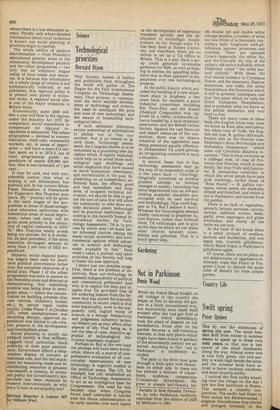Science
Technological priorities
Bernard Dixon
Next Sunday, hordes of boffins and politicians from throughout the world will gather in The Hague for the First International Congress on Technology Assess ment. Their purpose: to ruminate over the more sensible development of technology and science, the need to anticipate the pros and cons of new technology, and the means of forestalling technological idiocy.
If such optimistic intentions,
savour somewhat of exhortations to abolish war or love one another, that is no reason to ig
nore them. Technology assess ment, the Congress theme, is to be welcomed as a promising new dis
cipline which, if rightly exploited, could help us to avoid those technological ugly ducklings and white elephants that have caused so much frustration, resentment, and recrimination in the past. By predicting, on an independent, unfettered basis, the effects, good and bad, immediate and longterm, of incipient technical innovation, we should be able to garner the sort of data that will allow the community to take more sensible decisions about technology and its practical deployment. According to the recently formed International Society for Technology Assessment, TA is "a process by which men can make better informed choices. among the many social, economic, and environmental options which advances in science and technology make available to him." Next week's cabal, a journal, and other activities of the Society will help to foster the new approach.
I detect just two possible snags. First, there is the problem of objectivity. How can technology be assessed independently of political and commercial pressures? And who is to exploit the data and insights that TA provides? One of the enduring lessons from the ferment that has stirred the scientific community in recent years is that total impartiality, even in the supposedly cold, logical world of science, is a mirage. Subjectivity and judgement influence technical debate just as they affect other aspects of life. That being so, is not the idea of calm, objective appraisal of technological innovation hopelessly utopian?
Perhaps so. But at the very least the attempt will have been worthwhile. Above all, a source of comprehensive evaluation of all conceivable repercussions of new technology is urgently needed in the political arena. The US, for , example, has just established an Office of Technology Assessment to act as an intelligence base for Congressmen. The need for this became clear when Congress found itself embroiled in battles with the Nixon administration in its early months over such topics as the development of supersonic
transport aircraft, and the deployment of antiballistic missile
systems. So far, though some TA has been done at Sussex University and elsewhere, there are no moves to set up a TA Office in Britain. That is a pity. Such a setup could generate invaluable guidance for MPs, as well as helping to redress the appalling imbalance that is often apparent in disputations over new technological projects. At the publiciriquiry which preceded the building of a new aluminium plant in Anglesey a few years back, for example, a giant industrial consortium including Rio Tinto-Zinc and the Kaiser Chemical Corporation was opposed by a lowly.. ramshackle .alHance headed by a local residents' association and the British Lichen Society. Against the vast financial and expert resources of the consortium, there was no chance whatever of the opposition case. being presented equally effectively. Independent TA could provide an invigorating correctiv'e in such a situation.
A second, lesser fear is that technology assessment may go the way of its antecedent craze of .a few _years back — futurology. Originally conceived as another prudent attempt to forecast changes in society, futurology has since degenerated into an inwardlooking academic discipline preoccupied with its own survival and methodology. That could hap'pen to TA. But I believe it won't. Whereas the futurologists seemed chiefly concerned to prophesy future horrors, rather than forestall them, TA enthusiasts aim to give us the data on which we can make wiser choices between possibilities and priorities. That is a much better idea. _


































 Previous page
Previous page